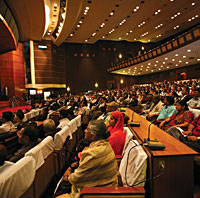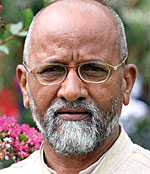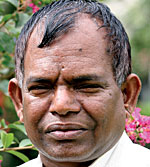 KIRAN PANDAY |
There was optimism when the country was declared a democratic republic by the first CA session abolishing the 240-year old monarchy. But things did not move as expected after that. The political parties could not reach the necessary consensus that would pave the way for the writing of a new constitution. We were divided into ruling and opposition parties in forming the government, and even the president was not elected unanimously.
We avoided the provision of opposition in the CA regulations to make it different from a parliament, and banned the disruption of its sessions. But the constitution writing process is affected by political squabbles over power.
Even so, the thematic committees are active in drafting the new constitution and the CA sessions have been going on. Some issues on their agenda have not been properly thrashed out, and parties have made it a prestige issue. Discussions have got stuck over whether or not the phrase 'people's war' and 'People's Liberation Army' should be used.
There is a culture of 'I am right you are wrong', and 'I have all the answers'. The constitution is ultimately a document of compromise. The political parties sometimes forget this. We established a democratic republic, but no culture of democracy yet.
Looking from outside, the CA members do not seem to have worked at all. They are getting allowances from the state just to bicker, it is said. There is a saying: 'to look at everything with doubt is a misuse of the eyes'. It is natural to have curiosity about what the representatives are up to, but if we are so cynical that we write them off it doesn't help strengthen the institution of democracy. We should understand that if parliament is weakened, the people are weakened.
The thematic committees have worked hard. They prepared questionnaires and collected public opinion. The discussions with experts, studies of collected suggestions and regular meetings are significant tasks in the process of writing the constitution. The CA members studied the suggestions and now are preparing the conceptual drafts of the constitution.
Four thematic committees already submitted their drafts to the CA. There have been changes in the previous schedule of the CA but things are happening as scheduled these days. No matter how active the CA is, the first condition for constitution writing is political consensus, without which the constitution will not be written.
Some people believe that there can only be political consensus, not anational consensus as Nepal is a multi-ethnic, multi-lingual and multi-religious country. Our nation's multiple identities should be seen as an advantage, not a curse.
We got mandate for two years to draft the constitution, there are now nine months to go. As the deadline draws near, there are doubts that the constitution will not be written on time. It is unfortunate that the political parties are engaged in making and breaking the government instead of drafting the constitution.
It has become a clich? to say it, but we must work towards a consensus and move ahead.
Rabindra Adhikari is a CA member of UML.
"Disagreement is the main problem"
Allauddin Ansari, RPP CA member, Nawalparasi
How did you spend the last year in the CA? 
The constitution-writing process is in motion. I'm a member of the State Restructuring Committee. Some committees are stuck as they're being reconstituted. Others are held back due to the lack of trust between politicians. That's why I'm beginning to doubt whether the constitution will be written on time. But the committees are still working. In a couple of days, we'll submit a preliminary draft that outlines the administration for the centre, local and provincial levels.
Will the constitution be written on time?
There's no need to rush. The constitution must be good, even if it is late. I can't say for sure whether it will be written on time. With regard to committee rules and regulations, although the party whips haven't interfered, they're still divided. The process is getting delayed. Basically, they are all saying the same things and yet the parties are divided. So, how could the constitution possibly be written on time? Everybody needs to put aside their differences. It'll be difficult to write the constitution while the Maoists aren't in government.
What's delaying the constitution?
The main reason is that the big party leaders can't agree with one another. As soon as they do, the constitution-writing process will get back on track.
Don't the small parties have a role?
Only if the big parties stop bickering and get together. The big party leaders don't even attend the meetings, they just mill around and chat.
"Leadership must untie the knots of problems"
Lal Babu Pandit, UML CA member, Morang
How did you spend the last year in the CA? 
We haven't done what we should have achieved by now. If the party heads sit down and really try to solve our problems, the disagreements won't last. The people want the constitution to be written on time. We're working very hard, but it's up to the leadership to untie the knots.
Will the people get their wish that the constitution will be written on time?
Whether early or late, the people haven't gotten their wish, because they've brought the parties to this stage, telling them to write the constitution or die trying.
What's delaying the constitution?
The stubbornness of party heads is to blame. The main problem is that they're confused. They don't realise that the country's cause is bigger than theirs. If they don't stop soon, we'll have to rush things.
Is the CA's work satisfactory?
The constitution will definitely be written. But only 60 per cent of the CA's work has been properly completed.
Was there conflict between parties when the committee you lead, Protection of Rights of Minorities and Marginalised Communities, was writing its preliminary draft?
In the beginning, the decisions were taken unanimously. But after some time, the Maoists refused to sign the draft. They wanted the draft to be written under their leadership.


